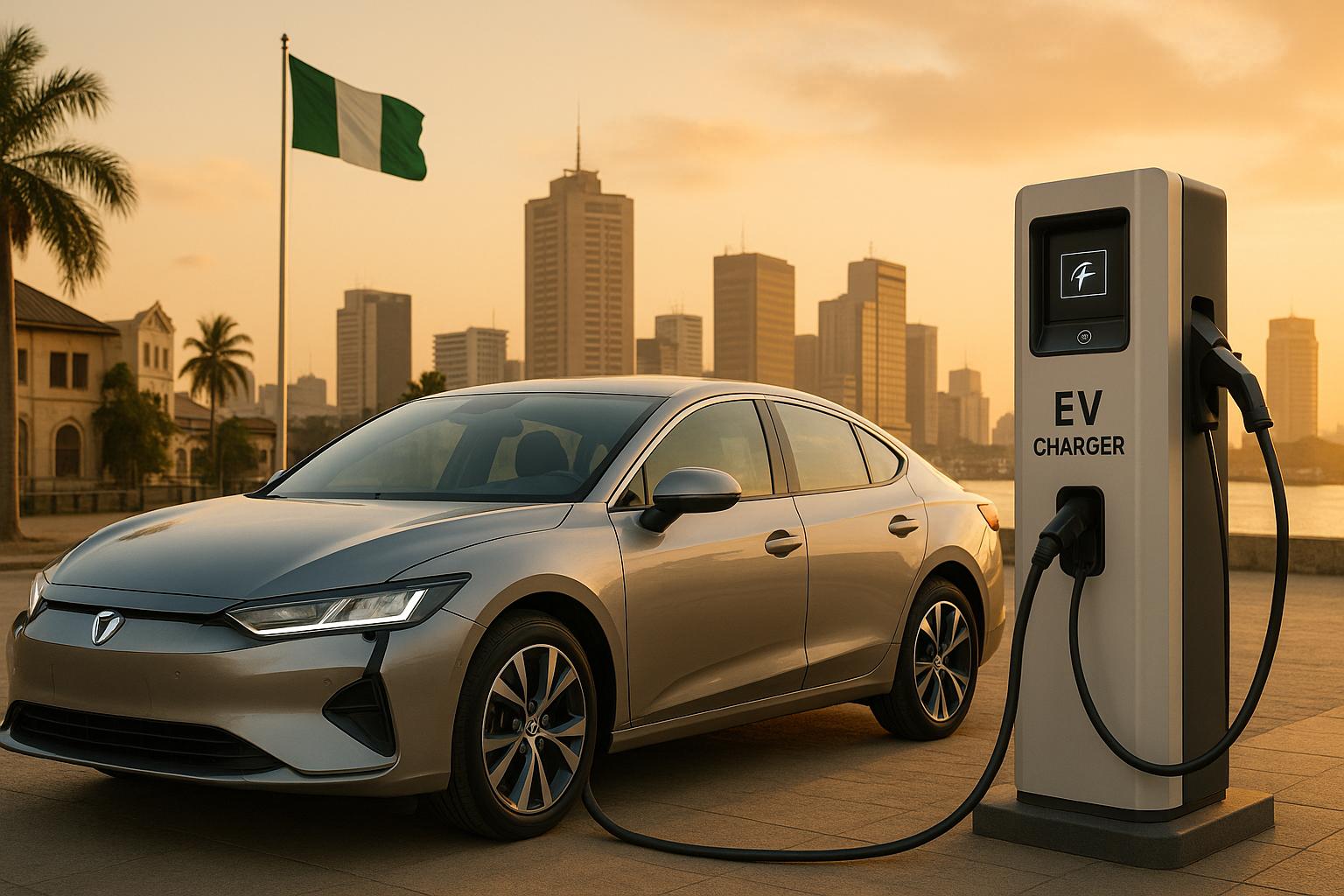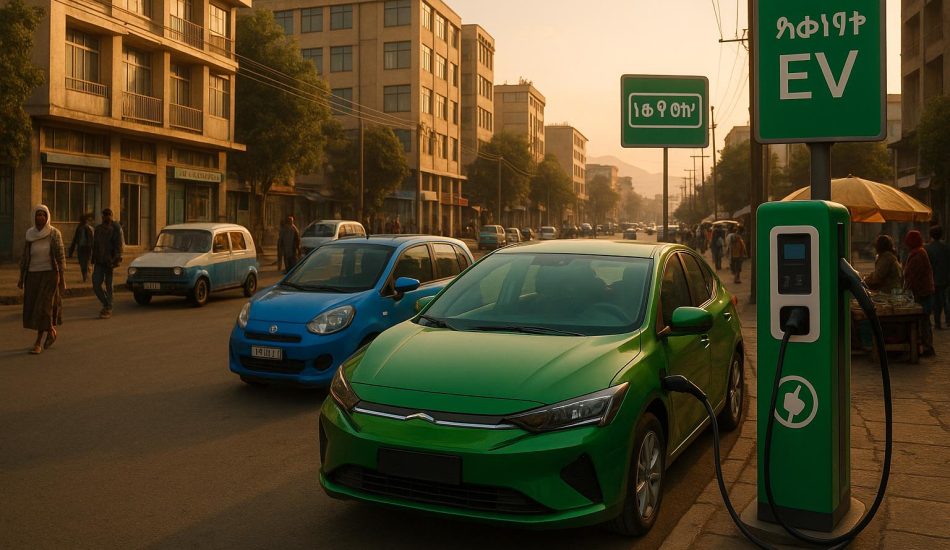
Nigeria is taking steps to boost electric vehicle (EV) adoption with tax breaks through 2025. These incentives aim to reduce the high upfront costs of EVs, encourage local manufacturing, and build charging infrastructure. Here’s what you need to know:
- Tax Incentives: Reduced import duties, VAT exemptions, and up to 10 years of tax relief for local EV manufacturers and component makers.
- Cost Impact: New EVs in Nigeria currently cost ₦12–28 million, compared to ₦6–15 million for petrol cars. Tax breaks aim to narrow this gap.
- Local Production Goal: By 2032, 30% of EVs sold in Nigeria must be locally produced.
- Adoption Targets: EVs are expected to make up 60% of the market by 2050 and reach full deployment by 2060.
- Infrastructure Growth: Solar-powered charging stations are being installed, and regulatory frameworks are being developed to support EV adoption.
The plan also aims to create jobs, reduce pollution, and position Nigeria as a leader in Africa’s EV market. With these steps, Nigeria is setting the stage for long-term growth in the EV sector.
Experts Explore How EV Market Can Scale in Nigeria
EV Tax Breaks and Incentives Through 2025
Nigeria’s National Action Plan introduces tax breaks aimed at reducing the steep upfront costs of electric vehicles (EVs). These incentives are designed to make EVs more accessible to both consumers and businesses, addressing the financial barriers that have long hindered their adoption.
The price disparity between EVs and traditional vehicles highlights the importance of these measures. In Nigeria, new EVs cost between ₦12 million and ₦28 million, while used models range from ₦5 million to ₦10 million. In contrast, a brand-new petrol-powered sedan is priced between ₦6 million and ₦15 million, making EVs a pricier option for most buyers.
Available Tax Incentives
The National Action Plan includes several financial incentives to ease the cost burden on EV buyers and manufacturers. Nigeria’s high import duties – sometimes reaching up to 70% of a vehicle’s value when combined with VAT and port fees – significantly inflate vehicle prices. For example, a Tesla priced at $35,000 in the U.S. can cost over ₦50 million in Nigeria due to these charges.
To counter these costs, the government has introduced reduced import duties and VAT exemptions. For manufacturers and assemblers, the policy offers a 10-year tax relief for companies producing EVs locally. Additionally, assemblers and manufacturers of automotive components receive a 5-year tax relief, while those focusing specifically on EVs and their components enjoy a full 10-year tax break.
Who Qualifies for Tax Breaks
The plan outlines specific eligibility criteria for individuals and businesses. These incentives are available to a range of stakeholders within the EV market. For individual buyers, tax credits help offset the price premium of up to 23% over comparable fuel-powered vehicles, making EVs a more attractive option when factoring in lower running costs over time.
Businesses stand to gain even more. Companies that establish EV manufacturing operations in Nigeria qualify for a full 10-year tax relief, which supports vehicle assembly and strengthens local supply chains. Importers and dealers also benefit from reduced import duties and VAT exemptions, potentially passing these savings on to consumers to make EVs more affordable.
The incentives particularly favor local production. Companies that commit to manufacturing at least 30% of their EVs domestically by 2032 align with the government’s broader objectives and are eligible for the most extensive benefits.
Tax Break Duration and End Dates
The timeline for these incentives varies depending on the type of benefit and the recipient. Reduced import duties and VAT exemptions for EVs will remain in place through 2025, giving consumers and businesses a limited window to take advantage of these savings.
For manufacturers, the incentives extend further. Companies producing EVs locally receive a 10-year tax relief from the start of their operations. Assemblers and component manufacturers receive 5-year tax reliefs, while those focused on EVs and their components enjoy a full decade of tax breaks. This phased approach ensures immediate benefits for early adopters and long-term support for manufacturers.
How Tax Breaks Will Affect Nigeria’s EV Market
Tax incentives are set to reshape Nigeria’s EV market. With an estimated 15,000 to 20,000 electric vehicles (EVs) currently on the country’s roads, these financial measures aim to tackle the challenges that have slowed adoption so far.
Tackling Barriers to EV Adoption
One of the most immediate effects of these tax breaks is the potential to close the price gap that has made EVs less affordable for many Nigerians. For example, while petrol-powered sedans typically cost between ₦6–15 million, EV models range from ₦12–28 million. By reducing import duties and exempting EVs from VAT, the government aims to bring down these costs, making EVs a more realistic option for a larger segment of the population.
The tax incentives also address setup costs, such as the expense of installing home Level 2 chargers, which currently range from ₦500,000 to ₦1.5 million. Additionally, loan guarantee programs introduced by the government can reduce interest rates for both vehicle purchases and charging infrastructure installations, further cutting the overall cost of ownership. Together, these measures create a more affordable pathway to EV adoption.
"Policy inconsistencies have hindered market growth and discouraged private-sector investment", says Chris Obikunle, an automotive expert.
By introducing these financial incentives, Nigeria is working to establish a more stable and supportive environment for EV adoption.
Anticipated Market Growth
As EV prices drop, sales data suggests the market is poised for significant growth. Between 2020 and 2022, EV sales climbed from 4.22% to 7.11% of total vehicle sales. Looking ahead, the market is projected to grow at a compound annual growth rate (CAGR) of 6.8% from 2025 to 2031. If these trends hold, the number of EVs on Nigerian roads could increase substantially in the coming years.
Local companies are already capitalizing on this momentum. NEV Electric, for instance, reported $14 million in revenue over a 14-month period ending in April 2025. The company plans to install 300 charging stations in Abuja and Lagos by August 2025, alongside ambitious goals to manufacture 2,000 high-capacity EVs and 10,000 micro EVs by the end of the year. Similarly, Spiro has shipped 22,000 EV bikes and secured $50 million in debt financing. The company has plans to expand its operations, with goals to deploy 140,000 bikes in Uganda within five years and 1.2 million in Kenya.
Boosting Local Manufacturing and Assembly
The tax incentives don’t just focus on affordability – they also aim to strengthen domestic production. Local manufacturers are eligible for a 10-year tax relief if they ensure that 30% of their EVs are produced domestically by 2032. This policy is designed to reduce Nigeria’s dependence on imported vehicles while creating jobs and fostering technical expertise in the automotive industry.
Component manufacturers also benefit from tax relief, which encourages the development of a more comprehensive EV ecosystem. By supporting local production, these measures help lower costs and set the stage for the robust growth expected in Nigeria’s EV market.
In addition to reducing reliance on imports, expanding local manufacturing positions Nigeria as a key player in the regional EV market. Growing environmental awareness and advancements in technology further strengthen the case for long-term growth in the sector, ensuring that the benefits of these tax breaks extend well beyond their 2025 expiration date.
How Tax Breaks Help Consumers and Businesses
Consumer Cost Savings
Tax breaks like eliminating customs duties and VAT exemptions significantly reduce the upfront costs of electric vehicles (EVs). This helps narrow the price gap between traditional petrol-powered cars and EVs, making them more affordable for middle-class families and professionals.
Fleet operators and corporate buyers also benefit from these savings. Businesses switching to electric fleets can take advantage of tax relief to offset the high initial costs of EVs. Over time, they also save on fuel and maintenance expenses. This combination of cost reductions and environmental benefits has led to a growing interest in EVs among corporate organizations and fleet operators, creating new opportunities for both consumers and businesses.
Business Opportunities for Startups and Dealers
Tax incentives don’t just help buyers – they also open doors for entrepreneurs and established businesses to enter Nigeria’s expanding EV market. Michael Agbor, General Manager of EV World Africa, highlights this shift:
"The EV adoption in Nigeria has transitioned from skepticism to growing interest and gradual adoption".
This growing interest is fueling innovative business models and new revenue opportunities.
Dealerships gain a competitive edge by leveraging tax incentives to offer more attractive pricing while maintaining profitability. Meanwhile, the Nigerian Startup Act 2022 provides additional tax benefits to eligible startups, encouraging investments in EV-related sectors. Small and medium-sized enterprises (SMEs) can also tap into the EV supply chain, focusing on components, batteries, and charging infrastructure.
The automotive sector’s economic impact is already evident, contributing approximately ₦444.4 billion (around $1.2 billion USD) to Nigeria’s GDP in 2020. With projections showing the Nigerian EV market could surpass ₦1.6 trillion by 2030, businesses entering the market early have a chance to secure a strong foothold as adoption grows.
Building Green Business Models
Tax breaks do more than just cut costs – they make environmentally friendly practices financially appealing. This balance of profitability and sustainability is encouraging businesses to adopt greener strategies.
The EV industry is expected to create thousands of jobs while reducing pollution-related losses worth billions of naira. This growth provides businesses access to a skilled workforce, enabling them to lead on sustainability initiatives. Companies that prioritize environmentally conscious practices may also attract customers and partners who value these efforts.
Service-based businesses have opportunities too. Specializing in areas like EV maintenance, charging infrastructure management, or fleet conversion consulting can open up new revenue streams while supporting the transition to electric mobility.
sbb-itb-99e19e3
Nigeria’s Impact on the African EV Market
Nigeria as Africa’s EV Leader
Nigeria, Africa’s most populous nation, is positioning itself as a leader in the continent’s electric vehicle (EV) revolution. While EV adoption in the country is still in its early stages, Nigeria’s ambitious policies are laying the groundwork for significant progress. The country’s pledge through the Zero Emission Vehicles (ZEV) Declaration – aiming for 100% zero-emission sales for all new cars and vans by 2040 – sets a bold example for the region. Additionally, the National Action Plan emphasizes domestic EV production, signaling a desire to build a self-reliant EV industry rather than depending heavily on imports.
With rapid urbanization and a growing population, Nigeria is becoming an attractive market for international investors. Major cities like Abuja and Lagos are seeing an increase in global EV brands, highlighting a rising confidence in Nigeria’s potential. Chinese companies, for instance, are investing in local EV manufacturing plants, marking a shift toward diversifying the economy beyond oil dependence. These developments align with Nigeria’s broader goals of economic growth and environmental responsibility.
Meeting Economic and Climate Goals
Nigeria’s shift to EVs addresses two pressing challenges: reducing carbon emissions and diversifying the economy. As one of Africa’s top carbon emitters, the country faces mounting pressure to tackle its environmental footprint. The transportation sector alone contributes 48% of Nigeria’s annual CO₂ emissions from fuel combustion, making EV adoption a critical component of its climate strategy.
The Energy Transition Plan sets ambitious targets, including a 60% EV market share by 2050 and a complete transition to EVs by 2060. The plan also envisions 13 million electric vehicles on Nigerian roads by 2050, signaling a dramatic transformation in transportation. Beyond environmental gains, these initiatives are expected to fuel economic growth. The African EV market, for instance, is projected to expand from $15.80 billion in 2024 to $25.40 billion by 2030. Nigeria’s efforts to achieve these goals could also strengthen its role in fostering regional economic partnerships.
Cross-Border Trade and Partnership Opportunities
Nigeria’s forward-thinking EV policies are influencing the broader African market, encouraging collaboration and boosting trade opportunities. Its alignment with nations like Ghana, Kenya, and Rwanda through the ZEV Declaration is helping to establish unified regional standards. These shared frameworks can simplify manufacturing and distribution for companies aiming to serve multiple markets.
Ethiopia’s recent ban on non-electric vehicle imports, effective January 2024, highlights how progressive policies are shaping the continent’s transition to e-mobility. As Africa embraces this shift, new opportunities for cross-border partnerships are emerging.
"The e-mobility revolution is underway in Africa, improving livelihoods and creating better-paying jobs for young people. At GreenMax, we are committed to delivering financing solutions that accelerate this transition."
- Koye Alaba, Director of Off-Grid Transaction Advisory at GreenMax Capital Group
The growth potential is evident: the EV market across Africa and the Middle East is projected to rise from $2.8 billion in 2023 to $7 billion by 2028. Nigeria’s focus on developing local battery production and EV assembly plants positions it as a key hub for value-added manufacturing. Strategic collaborations, such as those with Morocco, are already in motion, aiming to enhance Nigeria’s EV production capacity. These partnerships enable technology sharing, infrastructure development, and streamlined supply chains across the continent.
The Nigerian Senate’s approval of the Electric Vehicle Transition and Green Mobility Bill, 2025, further underscores the country’s commitment to green transportation. This legislative framework provides the stability needed to attract long-term investments and drive the EV industry forward.
Conclusion
National Action Plan Results Summary
Nigeria’s National Action Plan, combined with its EV tax incentives, marks a bold step toward reshaping transportation in the country. This strategy is already delivering tangible outcomes. By early 2025, Nigeria had an estimated 15,000 to 20,000 electric vehicles on its roads, making up about 0.5% to 1% of the total vehicle population. While these numbers may seem modest, they set the stage for a broader shift toward electric mobility across Africa.
The tax breaks and reduced import duties have created a welcoming environment for both local and international investment. A standout example is EV Automobiles, a subsidiary of the Nedcomoaks Group, which introduced 2,000 electric vehicles in 2023. Beyond vehicle deployment, the company has been building a supportive ecosystem, including solar-powered charging stations and training programs aimed at certifying over 1,000 EV professionals within two years. This demonstrates how fiscal incentives can accelerate EV adoption while fostering industry growth.
On top of the economic gains, the plan addresses critical public health and environmental issues. Fossil fuel vehicles contribute nearly 75% of Nigeria’s transport-related CO₂ emissions and are linked to approximately 1,500 premature deaths annually due to air pollution. By emphasizing the goal of producing at least 30% of EVs domestically by 2032, the plan also opens doors for local manufacturing and job creation.
"Electric mobility holds the key to Nigeria’s sustainable future, offering not just cleaner transport solutions but also paving the way for technological advancement and energy security."
– Lolade Abiola, Programme Manager, Energy Transition Office Nigeria
Nigeria’s EV Market After 2025
Looking beyond 2025, Nigeria’s EV market is poised for further growth. The conclusion of the initial tax break period will mark a transition from government-driven incentives to market-driven momentum. Projections suggest the EV market in Nigeria will grow at a compound annual growth rate (CAGR) of 6.8% from 2025 to 2031, fueled by rising environmental awareness, technological progress, and supportive policies. These trends align with Nigeria’s ambitious goals, such as achieving a 60% EV market share by 2050, full market penetration by 2060, and 100% zero-emission sales for new cars and vans by 2040.
As local manufacturing ramps up to meet the 30% domestic production target by 2032, consumers and businesses can expect lower costs and greater availability of electric vehicles. The groundwork laid during the tax break period – such as expanded charging infrastructure and a growing pool of skilled EV technicians – will continue to support this market expansion.
However, there are challenges ahead. The government’s recent focus on promoting Compressed Natural Gas (CNG) vehicles has introduced some uncertainty about how quickly EV adoption will progress. Balancing these priorities will be crucial in maintaining momentum.
Still, Nigeria’s long-term targets send a clear message to stakeholders, from manufacturers to infrastructure developers and consumers. With nearly two decades to prepare for a complete shift to zero-emission vehicles, the country is setting the stage for a transformative change.
"RMI’s analysis shows there’s a tremendous and immediate opportunity for Nigeria to lead in the transition to EVs, and for Nigerians to benefit from the rapidly growing cost-savings of e-mobility over traditional gas-powered vehicles."
– Kelly Carlin, Manager, RMI Carbon-Free Transportation Program
Ultimately, the success of Nigeria’s National Action Plan will be measured not just by the number of EVs on the road but by the broader impact on the country’s automotive landscape. The goal is clear: to drive sustainable growth, improve environmental outcomes, and enhance the quality of life for Nigerians through a forward-thinking, technology-driven approach. These efforts underscore Nigeria’s commitment to building a cleaner, more sustainable future.
FAQs
What are the requirements for businesses and individuals to qualify for EV tax breaks in Nigeria?
To take advantage of Nigeria’s EV tax breaks, businesses must meet a set of specific requirements:
- Be officially registered with the Corporate Affairs Commission (CAC).
- Possess a valid Tax Identification Number (TIN).
- Generate taxable revenue of at least ₦25,000,000 (around $32,500) in a single transaction or over the course of a year.
- Operate within a pioneer industry and hold physical long-term assets valued at more than ₦100,000,000 (about $130,000).
- Adhere to all necessary registration and operational guidelines.
For individuals, qualifying is generally tied to purchasing a new electric vehicle for personal use. Although details regarding income levels or specific vehicle criteria are less clear, buyers are expected to meet basic financial and regulatory standards for ownership.
These tax incentives are designed to make electric vehicles more attainable, supporting both businesses and consumers while promoting Nigeria’s vision for greener transportation.
What steps is the Nigerian government taking to expand EV charging infrastructure, especially in remote areas?
The Nigerian government is tackling the challenges of expanding EV charging infrastructure by adopting creative solutions designed for remote areas. One standout initiative includes solar-powered charging stations, like the pilot project at Usmanu Dan Fodio University. These stations leverage abundant solar energy, making them a smart fit for areas with limited access to conventional power grids.
There’s also a push to integrate EVs with microgrid systems, utilizing surplus energy from renewable sources such as solar power. Plans are in motion to roll out off-grid charging stations, which can operate independently of traditional power networks. On top of that, advanced technologies, including AI-enabled security systems, are being explored to enhance both reliability and safety.
These combined efforts aim to make EV charging more accessible in underserved regions, aligning with Nigeria’s broader vision for sustainable transportation.
What economic and environmental benefits could Nigeria see by producing 30% of EVs locally by 2032?
Nigeria’s Ambitious EV Production Goals
Nigeria has set its sights on producing 30% of its electric vehicles (EVs) locally by 2032, a move that could bring substantial economic opportunities. This initiative is expected to stimulate job growth in manufacturing, reduce reliance on imported vehicles, and strengthen local industries. It’s a step that aligns with the nation’s broader objectives of boosting economic development and embracing technological progress.
From an environmental perspective, ramping up EV production domestically offers the potential to cut greenhouse gas emissions and reduce air pollution. These changes could lead to better public health outcomes while also supporting Nigeria’s climate commitments. That said, the environmental challenges tied to battery production – like carbon emissions during manufacturing – will need to be addressed to ensure the effort remains as sustainable as possible. This ambitious plan holds promise for driving economic growth while contributing to a cleaner, greener future.




